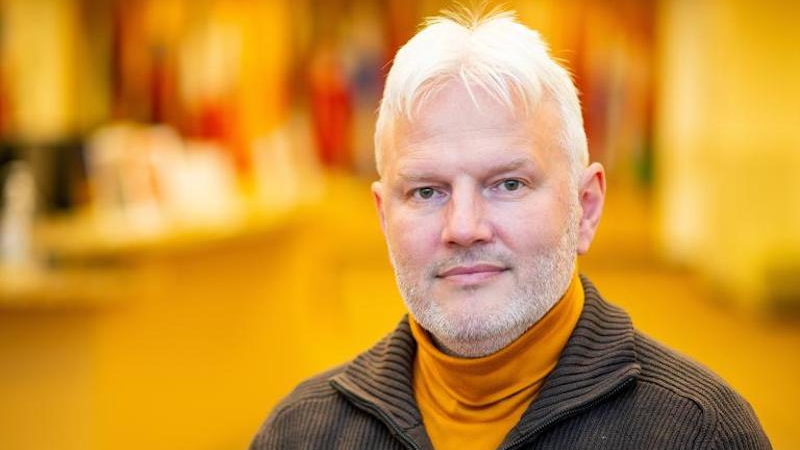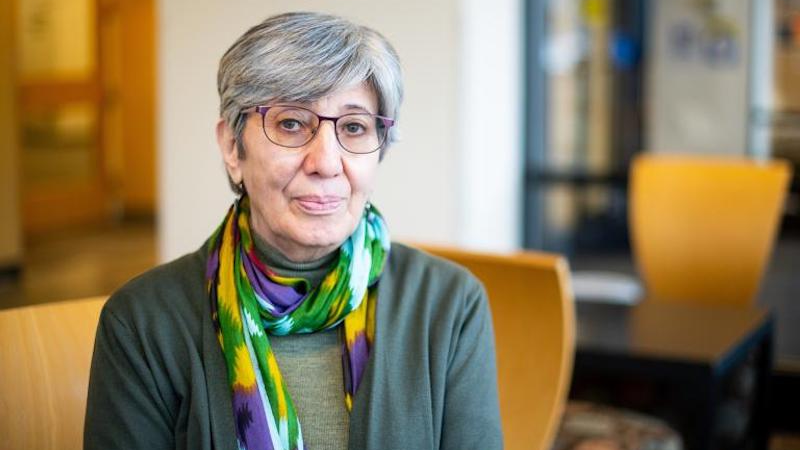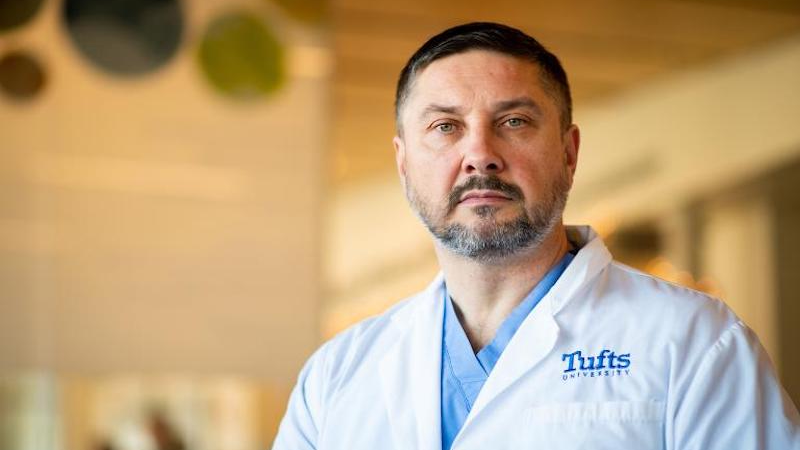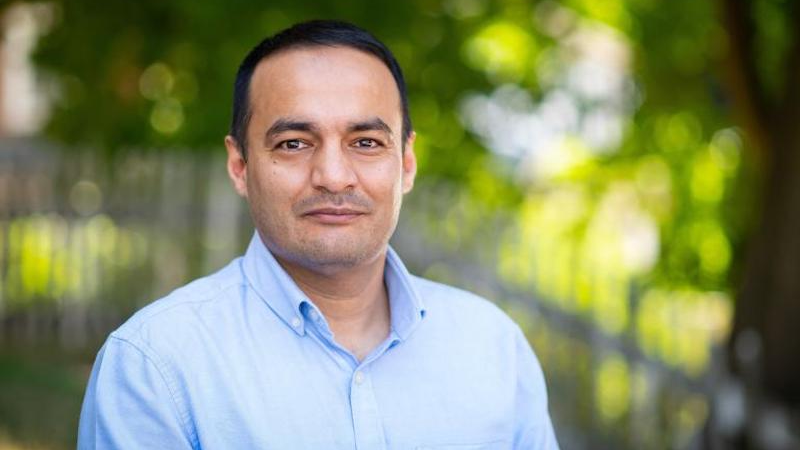
Tufts Offers Haven for Scholars at Risk
By Jennifer Wehunt and Heather Stephenson for Tufts Now
Tufts has hosted international academics in peril before. But the university had never supported four such scholars at once—until this year.
Since 2011 Tufts has participated in Scholars at Risk, a global network matching academics, artists, and public intellectuals facing danger in their home countries with temporary positions abroad. But after the Taliban took power in Afghanistan in August 2021 and Russia invaded Ukraine in February 2022, the network was “so completely overloaded that we just thought, OK, we should be taking applications directly,” said Diana Chigas, senior international officer and associate provost at Tufts.
That didn’t mean solely funding more fellows. It meant formally establishing Tufts’ own Scholars at Risk program, affiliated with the umbrella organization but administered on campus. The university makes all decisions about whom to host, in what capacity, and when. Beyond vetting applicants, the program ensures participants “have the support they need while they’re here,” from housing to mental health resources, said Chigas, who is also a professor of practice at The Fletcher School and a member of Tufts’ Scholars at Risk faculty committee.
While all four scholars currently at Tufts fled conflict zones, future participants might harbor views at odds with their home governments in times of relative peace and stability. “We want to support people who have something to contribute to their societies and to the world but can’t do it because they’re under threat,” Chigas said.
A university-wide endeavor, the program aims to benefit both the scholars and Tufts. Scholars receive a limited-term appointment during which they can continue their work safely. And the Tufts community has the opportunity to learn from people who have lived through extraordinary circumstances. “Looking at what’s happening around the world, in terms of authoritarianism and the undermining of democracy, this is part of the values of being a university,” Chigas said.
Meet Tufts’ four current Scholars at Risk.

Volodymyr Dubovyk
A Ukrainian professor of international relations teaches about the conflict in his homeland
When Russian forces invaded Ukraine on Feb. 24, 2022, classes at Odesa I.I. Mechnikov National University—like daily life across much of Ukraine—ground to a halt.
But only for two weeks.
“We decided we were going to continue teaching online,” said Volodymyr Dubovyk, associate professor of international relations and director of the Center for International Studies at Mechnikov, located on the Black Sea in southern Ukraine. “Because we had the COVID experience before that, everyone was ready, students and professors.”
That’s not to say life returned to business as usual, recalled Dubovyk, who maintains his position at his home institution while serving as a visiting professor at The Fletcher School and the School of Arts and Sciences, and a Tufts Scholar at Risk, for the 2022–2023 academic year.
Many students have left school—a result of wartime economics, Dubovyk said. And then there are the glaring signs of combat. “The air raid sirens were really unnerving,” he said. “Even when you know there’s probably no bomb coming where you are, you realize they’re falling somewhere else.”
Two weeks before the invasion, Dubovyk had fled to a small town near Ukraine’s western border. With the war raging, he finished the spring 2022 semester there, as thousands of fellow displaced civilians also headed west.
“I was sensing something in the air,” he said of his decision to leave home. “[Odesa] is situated in such a place where it can be attacked from several directions easily. We basically don’t have a navy. That’s why I moved out. And then, of course, I was vindicated.”
Although Odesa wasn’t initially targeted, Dubovyk was far from pleased to be proven mostly right. “Those first days, weeks, and months were absolutely unforgettable,” he said. “I had the impression that I didn’t sleep for weeks.”
His students were equally shocked and somber. In one of their first sessions back online, he asked where they were. One answered that she was in Kherson, a port city then occupied by Russia.
“She said, ‘There are some explosions not too far from where I am,’” Dubovyk recalled. “I decided at that point, I’m not going to ask where they are, because I could be jeopardizing their personal safety.”
His own safety was in doubt. In addition to teaching and serving as a Ukraine expert for the likes of CNN, Dubovyk was openly critical of Russia. If Russian forces reached where he was living, he worried he would be targeted, as had happened to colleagues in the Donbas region following Russia’s 2014 invasion there. “They barely escaped,” he said.
When approached about Scholars at Risk, Dubovyk began making plans. He arrived in Boston in early October 2022 and launched an abbreviated course in Black Sea security at Fletcher later that month.
Meanwhile, he continued teaching his Ukrainian students online.
“Our classes back home start at 2 p.m., which is 7 a.m. here,” said Dubovyk, a two-time Fulbright scholar. “I get up in the morning and do my class with my Ukraine students before Tufts.”
Beyond teaching the fall Fletcher module and a spring 2023 course on Ukrainian foreign policy for the Department of Political Science, Dubovyk has been invited to speak at institutions across the U.S. and abroad. He sees it as his responsibility to help international audiences understand the context of the current war, citing both historical foreign policy and present stakes.
“If you allow one dictator, like Putin, to do what he’s doing to Ukraine, then other dictators around the world could say, ‘OK, why not try the same thing with whichever neighbors we have and whatever we want to grab from them?’” he said.
Backing Ukraine is in keeping with American values, as well as in the national interest, Dubovyk says, citing key U.S. allies in Europe who depend on vulnerable energy pipelines crossing the battered region. He also sees it as his job to enlist prolonged support: “I’m trying to prepare people here, public opinion here, for the long haul, for not giving up on Ukraine.”
Dubovyk looks forward to the day when it will be safe to return home—and to see his brother and his 87-year-old mother, whom he talks to daily. In the meantime, he reiterates his gratitude for the assistance both he and Ukraine have received.
“Just this morning, I went for a coffee in a pastry shop here in Medford,” he said. “A lady heard my accent and immediately said, ‘Go, Ukraine!’ I think Ukrainians will forever remember that, in this time of dire need and despair, America stood with Ukraine.”

Sima Samar
An Afghan human rights leader documents abuses in her home country
As a girl and a member of Afghanistan’s Hazara minority, Sima Samar was not born to power.
Even so, she rose to an unprecedented level of influence. A Nobel Peace Prize nominee, she sat on advisory panels to the United Nations secretary-general and became Afghanistan’s first minister of women’s affairs and deputy prime minister of the Afghanistan Interim Administration in December 2001. She chaired the Afghanistan Independent Human Rights Commission from 2002 to 2019.
That couldn’t happen since the Taliban’s return to power in 2021, she believes. “Growing up in Afghanistan, as a girl, I have to say that it was much better than it is today,” said Samar, a visiting fellow at The Fletcher School and a Tufts Scholar at Risk.
Today the Taliban, which retook control of Afghanistan in August 2021 as U.S. and other international forces withdrew, has outlawed girls from attending school beyond sixth grade. The women employees of Shuhada, a network of hospitals and schools Samar founded, also face restrictions. Instructors have been asked to teach from home. Many women in medicine are allowed to keep practicing, due to the sensitivities of treating female patients, but “they are very, very careful,” said Samar, who started her career as a medical doctor.
“They dress the way they’re supposed to. They used to work long after dark, but now that’s not the case,” she said. “They’re not doing anything to give anyone a reason to cause a problem.”
For Samar, who once in addition to chairing the Afghanistan Human Rights Commission also headed the Commission on the Prevention of Torture, current conditions represent a painful break from more promising times.
She was in the U.S. in August 2021, when the Taliban retook control of Afghanistan for the first time in nearly 20 years. She had arrived in America that June with a coast-to-coast itinerary of visits to family she hadn’t seen during the height of COVID.
“I was traveling to Europe and the U.S. for 35 years,” she said. “I was not thinking I was going to be in a position to need to apply for asylum.”
She was scheduled to return from Boston to Kabul on August 10. As her departure approached, “Everyone was calling from Afghanistan and from here, saying, ‘Postpone your ticket,’” Samar recalled. She did, for two weeks.
“On the 15th of August, when I woke up in the morning, everything had fallen,” she continued. “I spoke with my husband [who was in Afghanistan and now has temporary residency in Germany], and he said, ‘Yes, there is fighting going on, but people will resist.’ I was also thinking the people will resist, the army will resist. [The Taliban] will not be able to take over so quickly. But I didn’t know the president would run away.”
Samar stayed in the U.S. and spent a year as a fellow at Harvard. In her two-year appointment at Tufts, she will continue to document human rights abuses in Afghanistan and to write her autobiography.
Samar sees her home government’s collapse as the latest in a string of implosions. “Afghanistan is a very good example of failure,” she said. “It’s become part of our history. The intervention of the USSR failed. The mujahedeen use of religion as a weapon failed. The extreme Taliban style failed. The intervention of the U.S. and European countries failed. And then the republic, which went in the direction of corruption, failed.”
But those failures give her hope. “This regime will also fail, because dictatorship is not going to work,” Samar said. Fear of violent reprisal has discouraged widespread civilian protest, she said, but that repression can’t last. She believes access to social media, nonexistent in the 1990s, will lead the people to rise. Another difference from the previous Taliban administration: international awareness of the group’s human rights record.
Just as Afghans must rally, so must Americans, Samar said. “It’s a responsibility. The problems in Afghanistan will not stay within our boundary walls. History repeats itself. It repeats itself in my country, but I don’t want that repetition in other countries.”
As she sees it, “Human rights should not be exchanged for what they call stability. It’s not stability when a woman does not feel safe, when a woman cannot work. It’s fake stability, fake security, when people don’t have food.”
For her, “Human rights values are not Western values. They are values wherever there are humans.”

Vladlen Ushakov
A Ukrainian veterinary surgeon leads an association of his colleagues while helping animals at Cummings School
On Feb. 24, 2022, as many Ukrainians made plans to flee their homes following Russia’s early-morning attack, Vladlen Ushakov went to work.
“People were in panic,” recalled the veterinary surgeon, an associate professor at Ukraine’s Vinnytsia National Agrarian University and president of the Ukrainian Small Animal Veterinary Association (USAVA). He’s now also a Tufts Scholar at Risk.
“Our clinic was open 24/7. The phone did not stop ringing,” Ushakov said in written comments. “Everyone needed help.”
With pet owners flooding Ushakov’s private practice in Odesa, he and his colleagues set about vaccinating and microchipping the domestic animals that soon would accompany their frantic families away from the war’s frontlines.
“It seemed to us that was very difficult,” Ushakov said of the war’s early days. “But now I understand that it was easy, because at that time, we still had communications and light, heat, and water—everything you need.”
As Odesa and other embattled cities emptied of civilians, Ushakov stayed in place, in part to sterilize the abandoned and stray animals left behind.
But Ushakov had another mission. Beyond caring for four-legged patients, he was helping Cummings School of Veterinary Medicine and other foreign institutions identify veterinarians who might temporarily leave Ukraine for safety—some with the mandate of establishing animal sterilization clinics at the country’s Polish and Czech borders. “We placed 300 doctors in Europe with colleagues in the first months of the war,” Ushakov said.
Eventually, as intermittent shelling continued on a Ukrainian military unit less than a mile from his Odesa home, Ushakov acknowledged it was time for him and his family to leave, too. In August 2022, he, his wife, and their 5-year-old son arrived in Grafton, Massachusetts, where Ushakov is an international veterinary fellow in the dean’s office at Cummings School. His wife, Natalia, is working as a patient coordinator at Cummings School’s Henry and Lois Foster Hospital for Small Animals, and their son has started preschool.
Ukraine remains top of mind for Ushakov, who had never previously lived or worked abroad. “The main thing is to support colleagues [so they don’t] feel alone,” he said. In addition to teaching at Cummings School and completing rotations in Foster Hospital for Small Animals, he is administering a multipronged USAVA program that he helped launch. The program is called BASED: “B” for business assistance, as in financial support for the eventual reopening of Ukrainian veterinary clinics; “A” for animals, reimbursing pet owners for the treatment of war-related injuries; “S” for shelter, providing havens for homeless animals as the conflict continues; “E” for education, helping temporarily displaced veterinarians pursue continuing education in their host countries; and “D” for destruction, raising funds to repair Ukrainian veterinary clinics damaged by combat.
“We have 31 hours [in a] day: 24 hours here in the U.S., plus 7 hours in Ukraine,” Ushakov said of USAVA’s efforts, including a February aid mission that helped fund the vaccination of 38,000 animals against rabies. “Our community protects 2,500 doctors of small animals, and about 15,000 [veterinarians] in all, and everyone needs support.”
While attending to the urgent needs of now, Ushakov is also looking toward the future, including postwar reconstruction. Even if peace arrived tomorrow, the education and careers of a generation of veterinarians have already been disrupted.
But the best redress is progress, Ushakov believes. Citing the educational and psychological support he and fellow veterinarians are receiving while away from home, he said: “This kind of cooperation will help in improving the qualifications of specialists and teachers in the field of veterinary medicine.” He added, “The help of Cummings School of Veterinary Medicine at Tufts University is a source of hope for Ukrainian veterinary universities.”

Mir Ahmad Shekib Mir
At The Fletcher School, a former Afghan bank official shares his expertise
When the Taliban seized power in Afghanistan in August 2021, Mir Ahmad Shekib Mir knew he had to leave his homeland. A longtime banking official with strong ties to the West, including Tufts, he had been critical of the militant group. His political views put him and his family in danger.
“If I left, maybe one day I can serve [my country],” he said. “But if I stayed, I wouldn’t have been able to say or do anything.”
Today Mir is living in Medford and working as a research analyst with The Fletcher School Leadership Program for Financial Inclusion. The position represents a return for Mir, who in 2020 became a fellow in Fletcher’s executive education program, burnishing his professional skills and forming ties with faculty that proved to be life-changing a year later.
“I am the luckiest Afghan evacuee, because of one reason: Tufts and Fletcher,” he said. When the Afghan government collapsed, a team of people associated with Tufts, including the financial inclusion program staff and research professor Dyan Mazurana, came to his aid. “There was no hope for the future,” he recalled. “It was like an angel is coming to support you.”
Mir and his extended family made a harrowing journey out of Afghanistan in late August 2021. Some of his siblings were involved in promoting human rights, women’s rights, democracy, moderation, and literacy, he said, and those efforts also put them at risk.
The family initially found refuge in Albania, where they lived for about eight months before making it to Massachusetts. They received free housing through an arrangement made by Elizabeth Ammons, a professor emerita at Tufts.
Mir’s wife is working for a nonprofit organization in Boston and hopes to study at a local university. Their two school-age sons started attending Medford public schools in spring 2022 and did well, even though their educations had been disrupted, he said. “They adjusted very quickly” and enjoy mathematics, soccer, swimming, and ice skating.
In his position at Fletcher, Mir enjoys sharing his expertise with others committed to improving the economies of developing nations.
“Mir was an outstanding participant in our program and has deep knowledge from his own experience in Afghanistan,” said Melita Sawyer, associate director of the Fletcher Leadership Program for Financial Inclusion. “He’s the perfect person to help us improve our offerings for our students.”
The Fletcher program helps policymakers from public institutions in developing and emerging markets learn how to make financial products and services like savings, credit, and insurance more accessible and affordable. The long-term goal is increasing sustainable economic growth.
Born in Kabul in the early 1980s, Mir fled with his family as a child in the aftermath of the Soviet invasion of Afghanistan. He grew up in Pakistan but returned to Afghanistan in early 2002, after the collapse of the Taliban regime that had taken power in 1996. He earned a bachelor’s degree in economics from Kabul University in 2006 and worked for the central bank of Afghanistan, known as Da Afghanistan Bank, in Kabul from 2008 until late 2020.
While on an educational leave from the central bank, Mir earned a master’s degree in economics from Williams College in 2016. On his return to Kabul, he was appointed the director-general of the bank’s Financial Inclusion Department and led efforts to implement Afghanistan’s first national financial inclusion strategy.
After leaving the bank, Mir contributed to articles about economic issues and corruption in Afghanistan. He had been preparing to teach principles he learned at Fletcher to students at Kabul University in the fall of 2021, but “I did not know where destiny would bring me,” he said.
His current role at Tufts is a far cry from what he had thought he might be doing upon leaving Afghanistan. “To be honest, my plan was to take any job and work there to feed my family and help my children study,” he said. Now, in addition to helping guide the next generation of fellows at Fletcher, he is an independent columnist, writing about current economic issues in Afghanistan and opposing Taliban policies.
As a research analyst, Mir helps current fellows at Fletcher by teaching and by reviewing and providing feedback on their research and policy papers.
“I’m more than glad that I can share the knowledge at the international level, with people all over the world,” he said. “The only thing that makes me sad is that I can’t share the knowledge and expertise with the institution I love, the central bank in Afghanistan.”
Jennifer Wehunt wrote the profiles of Samar, Dubovyk, and Ushakov. Heather Stephenson wrote the profile of Mir.
This post was republished from TuftsNow.
